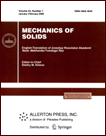 | | Mechanics of Solids
A Journal of Russian Academy of Sciences | | Founded
in January 1966
Issued 6 times a year
Print ISSN 0025-6544
Online ISSN 1934-7936 |
Archive of Issues
| Total articles in the database: | | 13427 |
| In Russian (Èçâ. ÐÀÍ. ÌÒÒ): | | 8178
|
| In English (Mech. Solids): | | 5249 |
|
| << Previous article | Volume 42, Issue 2 / 2007 | Next article >> |
| V. N. Maksimenko, E. G. Podruzhin, and P. E. Ryabchikov, "Stress-strain state of an anisotropic plate with curved cracks and thin rigid inclusions," Mech. Solids. 42 (2), 223-230 (2007) |
| Year |
2007 |
Volume |
42 |
Number |
2 |
Pages |
223-230 |
| Title |
Stress-strain state of an anisotropic plate with curved cracks and thin rigid inclusions |
| Author(s) |
V. N. Maksimenko (Novosibirsk State Technical University, pr-t K. Marksa 20, Novosibirsk, 630092, Russia, maxvn@ngs.ru)
E. G. Podruzhin (Novosibirsk State Technical University, pr-t K. Marksa 20, Novosibirsk, 630092, Russia, planer@craft.nstu.ru)
P. E. Ryabchikov (Novosibirsk State Technical University, pr-t K. Marksa 20, Novosibirsk, 630092, Russia) |
| Abstract |
We solve the bending problem for an anisotropic plate with flaws like smooth curved nonoverlapping through cracks and rigid inclusions. The problem is solved by the method of Lekhnitskii complex potentials specified as Cauchy type integrals over the flaw contours with an unknown integrand density function. We use the Sokhotskii-Plemelj formulas to reduce the boundary-value problem to a system of singular integral equations with the additional conditions that the displacements in the plate are single-valued when going around the cut contours and the equilibrium conditions for stress-free rigid inclusions. After the singular integrals are approximated by the Gauss-Chebyshev quadrature formulas, the problem is reduced to solving a system of linear algebraic equations. We study the local stress distribution near flaw tips. We analyze the mutual influence of flaws on the stress distribution character near their vertices and compare the well-known solutions for isotropic plates with the solutions obtained by passing to the limit in the anisotropy parameters ("weakly anisotropic material") and by using the method proposed here. |
| References |
| 1. | L. T. Berezhnitskii, M. V. Delyavskii, and V. V. Panasyuk, Bending of Thin Plates with Crack-Type Flaws (Naukova Dumka, Kiev,
1979) [in Russian]. |
| 2. | O. V. Onishchuk and G. Ya. Popov, "On Some Bending Problems for
Plates with Cracks and Thin Inclusions," Izv. Akad. Nauk SSSR.
Mekh. Tverd. Tela, No. 4, 141-150 (1980) [Mech. Solids (Engl.
Transl.)]. |
| 3. | O. V. Onishchuk, G. Ya. Popov, and P. G. Farshait,
"On Singularities of Contact Forces in Bending of Plates
with Thin Inclusions,"
Prikl. Mat. Mekh.
50 (2), 293-302 (1986)
[J. Appl. Math. Mech. (Engl. Transl.)]. |
| 4. | N. Shavlakadze,
"On Some Contact Problems for Bodies with Elastic Inclusions,"
Georg. Math. Journal
5 (3), 285-300 (1998). |
| 5. | N. Shavlakadze,
"On Singularities of Contact Stress upon Tension and Bending
of Plates with Elastic Inclusions,"
Proc. A. Razmadze Math. Inst.
120, 135-147 (1999). |
| 6. | G. N. Savin and N. P. Fleishman, Plates and Shells with
Stiffeners (Naukova Dumka, Kiev, 1964) [in Russian]. |
| 7. | S. G. Lekhnitskii,
Anisotropic Plates
(Gostekhizdat, Moscow, 1957)
[in Russian]. |
| 8. | V. N. Maksimenko and E. G. Podruzhin, "Bending of Anisotropic
Plates with Cracks of Complex Shape," Uchen. Zapiski TsAGI 20
(3), 81-90 (1989). |
| 9. | M. Isida,
"Bending of Plate Containing Arbitrary Array of Cracks,"
Trans. Japan. Soc. Mech. Engrs.
43 (367), 825-837 (1977). |
|
| Received |
22 March 2005 |
| Link to Fulltext |
|
| << Previous article | Volume 42, Issue 2 / 2007 | Next article >> |
|
 If you find a misprint on a webpage, please help us correct it promptly - just highlight and press Ctrl+Enter If you find a misprint on a webpage, please help us correct it promptly - just highlight and press Ctrl+Enter
|
|

 Russian
Russian  English
English